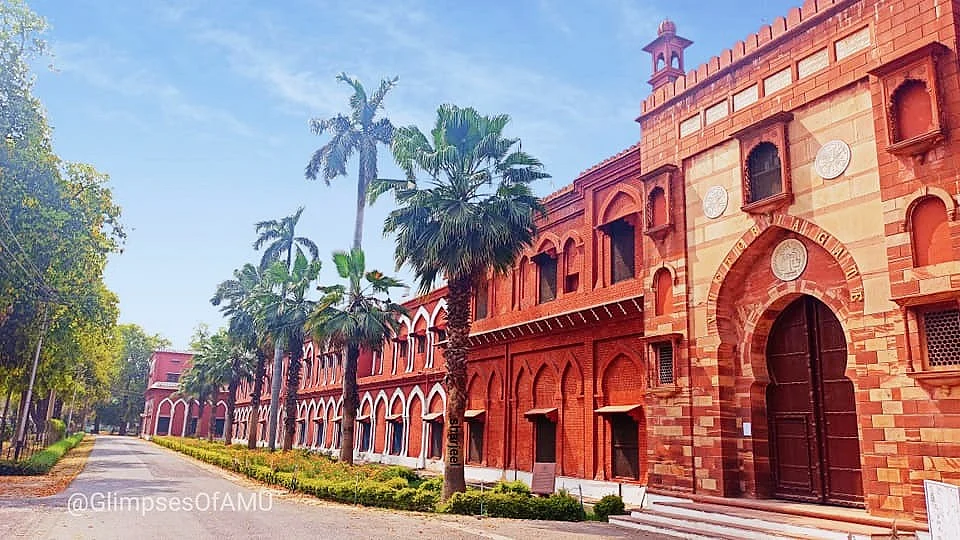AMU minority status case: How can you question an act of Parliament, CJI asks solicitor-general
The Supreme Court questioned solicitor-general Tushar Mehta’s argument that the current government did not accept the amendment made by Parliament to the AMU Act

A day after the Union government informed the Supreme Court that the Aligarh Muslim University (AMU) had surrendered its minority status by not opting for deemed university status and instead chose to be an institution under an act of Parliament, the apex court on Wednesday questioned solicitor-general Tushar Mehta’s argument that the current government did not accept the 1981 amendment made by Parliament to the AMU Act, which effectively accorded minority status to the institution.
A seven-judge Constitution Bench comprising Chief Justice of India D.Y. Chandrachud, justices Sanjiv Khanna, Surya Kant, J.B. Pardiwala, Dipankar Datta, Manoj Misra and Satish Chandra Sharma are hearing a batch of petitions examining the validity of the minority status accorded to AMU.
On the fifth day of hearing, Mehta said Allahabad High Court had struck down the 1981 amendment on various grounds, and he believed the Allahabad High Court’s view was correct.
To which Justice Khanna questioned if Mehta refused to accept the amendment. "No, I do not stand by the amendment,” stressed Mehta. At this juncture, CJI Chandrachud said the Parliament was indestructible, and “it is a union, it is irrespective of who espouses the Union government”.
“As the solicitor-general, you cannot say that you do not stand by the amendment. This will be a radical statement when the law officer tells us that he does not stand by what the Parliament has done, as the Parliament can of course bring in another amendment. Parliament is supreme and eternal, an indivisible entity under democracy. How can you say you do not accept the validity of the amendment?” underscored the CJI.
In 1967, a five-judge bench including then Chief Justice KN Wanchoo had said AMU was neither established nor administered by the Muslim minority, but in 1981, the AMU Act was amended to redefine the word ‘university’ as an educational institution “established by the Muslims of India”.
The Allahabad High Court had, in January 2006, struck down the provision of the AMU (Amendment) Act 1981, by which the varsity was accorded minority status. This was challenged by the then UPA government and the university in the Supreme Court. In April 2006, a division bench of Justices K.G. Balakrishnan and D.K. Jain stayed the reservation policy of AMU, and it was referred to a larger bench to decide.
In 2016, two years after the National Democratic Alliance government headed by the BJP came to power, the Union government withdrew from the case, stating that it does not recognise the minority status of AMU.
The CJI said the SG has to stand by what Parliament has done. “This would be radical because a law officer would be then telling us that I don’t abide by what Parliament has done. You have to stand by what Parliament has done. Parliament is undoubtedly supreme in law making function. Parliament can always amend the statute; in which case a law officer can say I have an amended statute now… Can we hear any organ of the Union government say that notwithstanding a Parliamentary amendment, I don’t accept this amendment?”
“And I can’t hear the Government say that an amendment which Parliament made is something I don’t stand by. You must stand by this amendment. You have an option to go through the amending route and change the amending act again,” added Chandrachud.
When the CJI reiterated that the Parliament was an indestructible entity under democracy, Mehta said he did not dispute it.
During the hearing, the CJI said the purpose of AMU was to provide secular education to the community, which was at its lowest when the institution was created. The solicitor-general then said, "A minority institution can be open to everyone; that wouldn't rob it of its minority character if its other attributes are satisfied."
While concluding the hearing for the day, the CJI said the administration’s case would be heard soon.
Follow us on: Facebook, Twitter, Google News, Instagram
Join our official telegram channel (@nationalherald) and stay updated with the latest headlines
